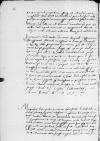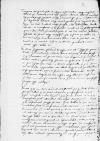Letter #1089
[Ioannes DANTISCUS] to [Cornelis DE SCHEPPER]Löbau (Lubawa), 1534-01-11
English register:
Dantiscus is concerned that he has not yet received De Schepper’s letter which was sent to him before De Schepper left for Spain, as was reported to him by the Archbishop of Lund [Johan Weze]. He has seen the copy of De Schepper’s letter to Count [Jan Tarnowski], so he fears that the letter addressed to him was intercepted.
As he wrote in a former letter, Dantiscus is pleased by the safe return of De Schepper from his embassy, and by the generous remuneration he has received from the King of the Romans [Ferdinand I], the news of which reached him via the Archbishop of Lund.
Dantiscus asks De Schepper to supervise the commission he gave to the Welsers for bringing his daughter Juana [Dantisca] from Spain to Antwerp, and to advance any costs. He promises to repay them through the Welsers.
Dantiscus transmits to De Schepper news from the Baltic Sea. The burghers of Lübeck are willing to make peace, because of the news that a storm almost completely destroyed the Netherlandish fleet off the coast of Norway. The peace negotiations that will soon take place in Bremen or Hamburg will be attended by the burghers of Bremen, Hamburg and Lüneburg. Gdańsk will arbitrate; its envoys have already set out. To give them a higher profile Dantiscus convinced the King of Poland [Sigismund I] to send one of his courtiers [Mikołaj Spiegel] to Hamburg with a letter. Dantiscus hopes that peace will restore free navigation, and better access to Gdańsk for the Dutch merchants, and thus, lead to a regular delivery of Gdańsk beer to De Schepper.
Dantiscus is thriving in the role of Bishop of Kulm. He longs for his friend and is willing to travel to Cracow, if De Schepper is sent there on an embassy. He asks De Schepper to entrust his letters to more trustworthy messengers and forwards greetings to comendador [Francisco] de los Cobos and [Nicolas Perrenot] de Granvelle, and the lords and his friends at court, especially the Count of Nassau [Hendrik III of Nassau-Breda]. In Austria and Bohemia, depending on where he receives the letter, De Schepper knows to whom he should convey Dantiscus’ greetings.
| received [Prague], [1535-02-05] Manuscript sources:
Prints:
| ||||||||||||||||||
Text & apparatus & commentary Plain text Text & commentary Text & apparatus Excerpts concerning Dantiscus' travels
Magnifice Domine, frater ex animo carissime.
Salutem tibi et omnis felicitatis precor accessum.
Superiori die accepi
Quod prius scripsi, gratum mihi plurimum est, quod ex tam periculosa legatione redieris, neque minus gratum, quod te serenissimus
Si es in
Nova, quae ex
Ego in hoc angulo pauper episcopus, qui tamen cum summo pontifice sortem meam commutare nolim, hic ago non feriatu[s] a curis domesticis neque adversitates a pessimis hominibu[s] mihi desunt, quos Deus ad exercendum patientiam meam contra me excitavit. Deo gratia, quandoquidem Ille fideles suos numquam deserit.
Aliud, quod hinc scribam, non habeo, quam quod te numquam ardentius videre desideravi, quam hoc tempore. Utinam sic se casus offerret, ut
Ex
[1 ] Dantiscus received this letter on February 13, 1534


